-
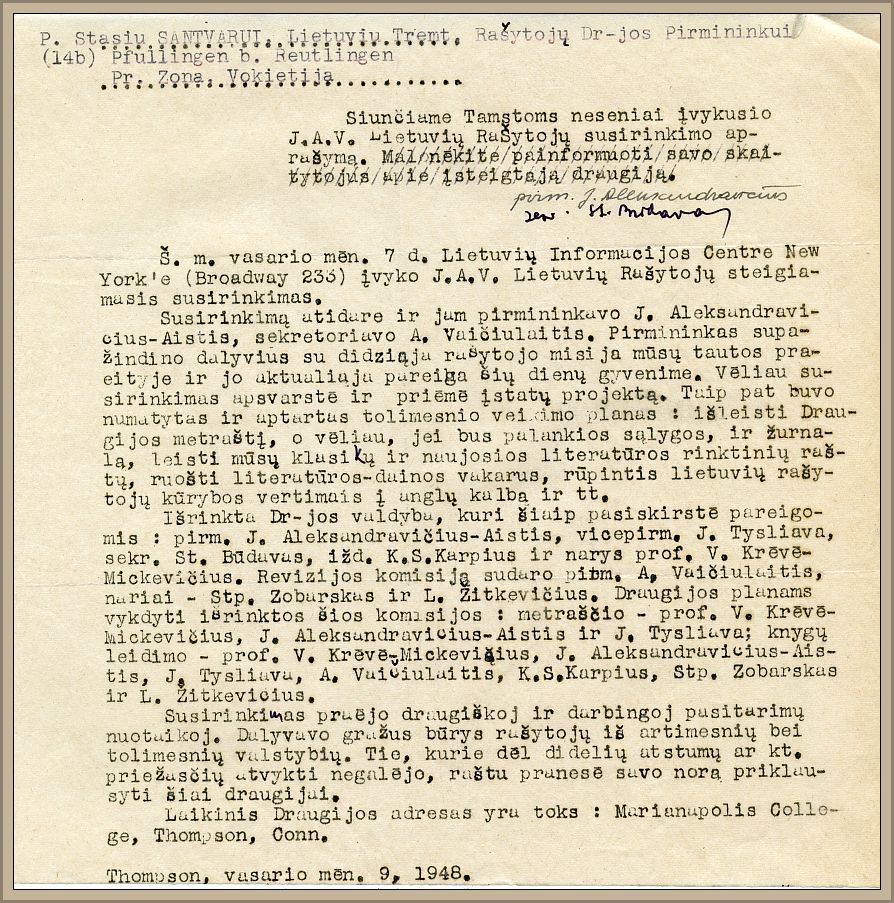
Association’s press release.
Once the emigration from a war-torn Germany began, the majority of Lithuanian writers chose the US as their new home. Among them was the poet Jonas Aistis-Aleksandravičius, who arrived in America on January 30, 1946. Two years later, on February 28, 1948, he and like-minded writers founded the Lithuanian Writers' Association of North America. Aistis was elected the chairman of the new organization. The Association shared its plans in a press release: to issue an annual chronicle and a magazine, if conditions allow; to publish Lithuanian classics and selected new literature; to organize literary events, and to translate Lithuanian writers’ works into English.
Aistis describes his trip to the US and jokes that he almost became the first DP to reach American shores: https://soundcloud.com/lituanika/jonas-aistis-kelione-laivu-i-jav
-
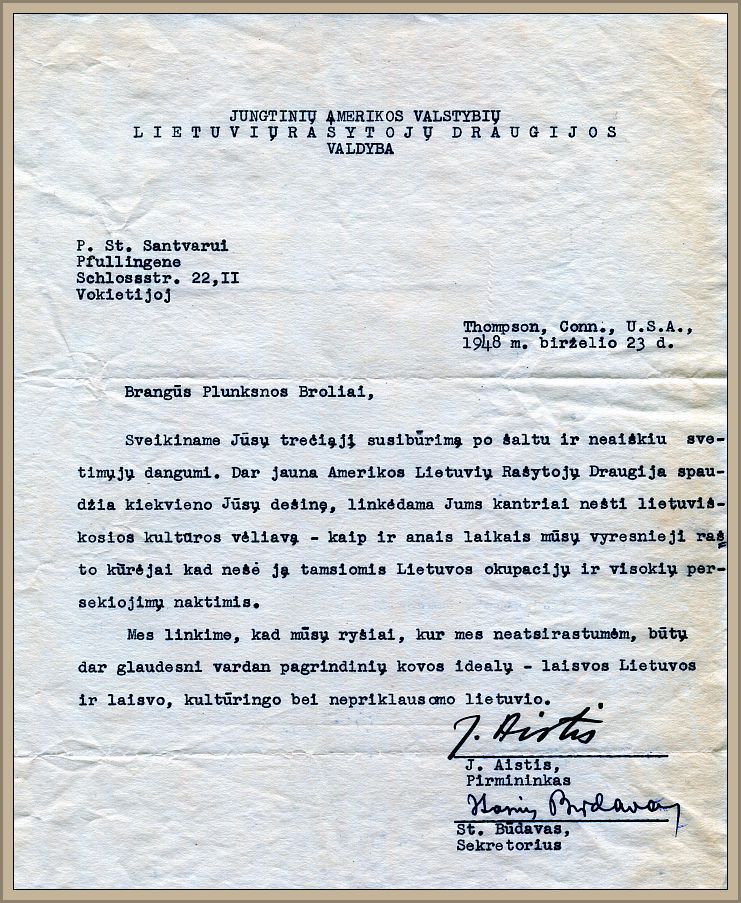
Aistis’ letter of greeting to the participants of the third LRAA congress.
There were two Lithuanian writers’ organizations for a part of 1948: the Lithuanian Refugee Authors’ Association in Germany and the Lithuanian Writers' Association of North America. They maintained friendly relations, regularly exchanging information and letters of greeting. For example, Aistis, the chairman of the association in North America, sent a friendly greeting on the occasion of the third congress of the LRA, held in Germany on June 23, 1948. “Dear Brothers of the Quill,” he wrote in his letter, “… a still very young American Lithuanian Writers' Association extends its hand to each one of you, wishing you perseverance in carrying the banner of Lithuanian culture, just as our elders … our founders carried it through the dark nights of occupations and various persecutions.”
-
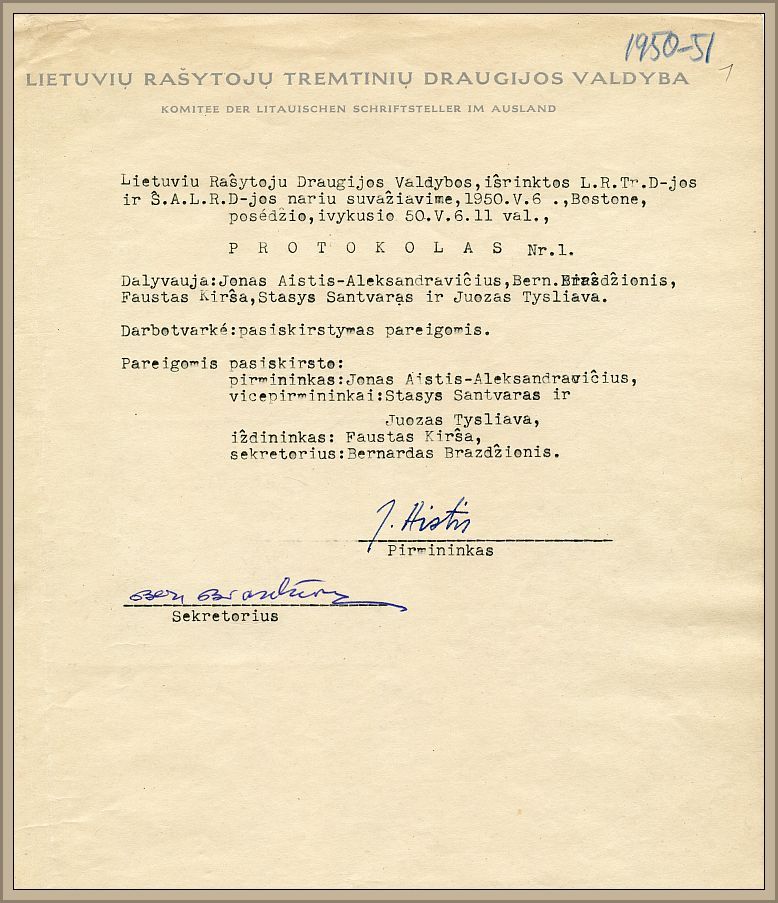
Minutes of the Lithuanian Writers’ Assoc. meeting held in Boston on May 6, 1950.
Nearly the entire Board of Directors of the LRAA had arrived in America by the autumn of 1949, except for Pulgis Andriušis, who immigrated to Australia. It was decided to merge the two organizations and representatives of both groups officially dissolved the Lithuanian Refugee Authors’ Assoc. at a joint meeting held in Boston in 1950, though in practice it merged with the Lithuanian Writers' Association of North America. The new organization was named the Lithuanian Writers’ Association, with Aistis elected its chairman and Santvaras its vice-president. Dr. Žydronė Kolevinskienė points out that the new association “acted according to the revised regulations of the Lithuanian Refugee Authors’ Assoc. and the former Lithuanian Writers’ Union and that all LWA members automatically became members of the new association.” In this way, the former status of the Lithuanian Writers’ Union was resumed.
-
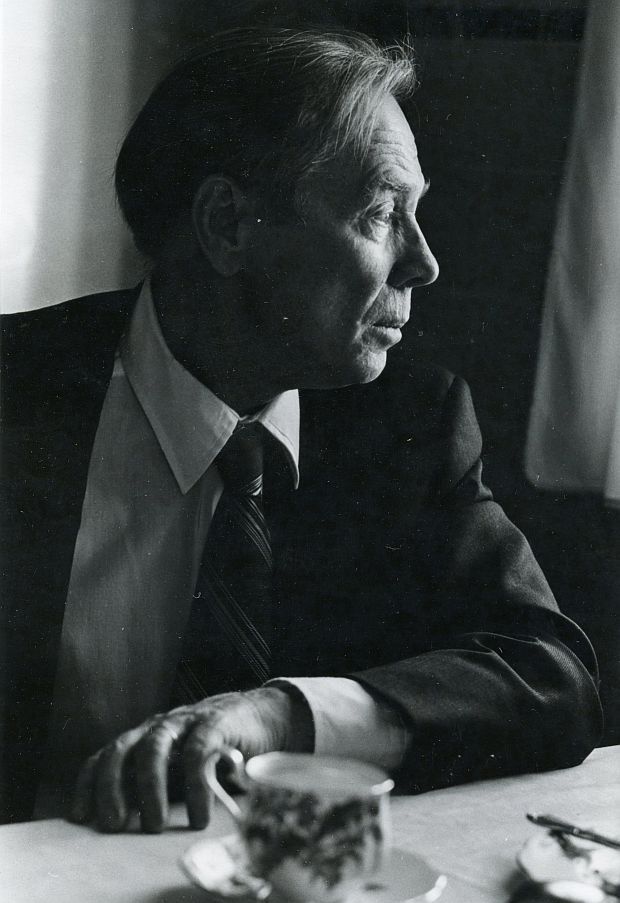
Jonas Aistis, chairman of the Lithuanian Writers’ Association, 1950-1951. Photo by V. Maželis.
In private letters to his colleague Antanas Vaičiulaitis, Aistis complained about the immense work-load he shouldered while acting as chairman of the Lithuanian Writers' Association of North America. “I am firm in my decision to resign from the chairmanship for the simple reason that all the members are indifferent to the affairs of the Association. ... I even regret that we became involved in it,” he wrote in a letter dated April 24, 1949. Yet Aistis was elected a chairman of the new Lithuanian Writers’ Assoc. and chaired it until mid-1951 even though he did not attend the joint meeting.
-
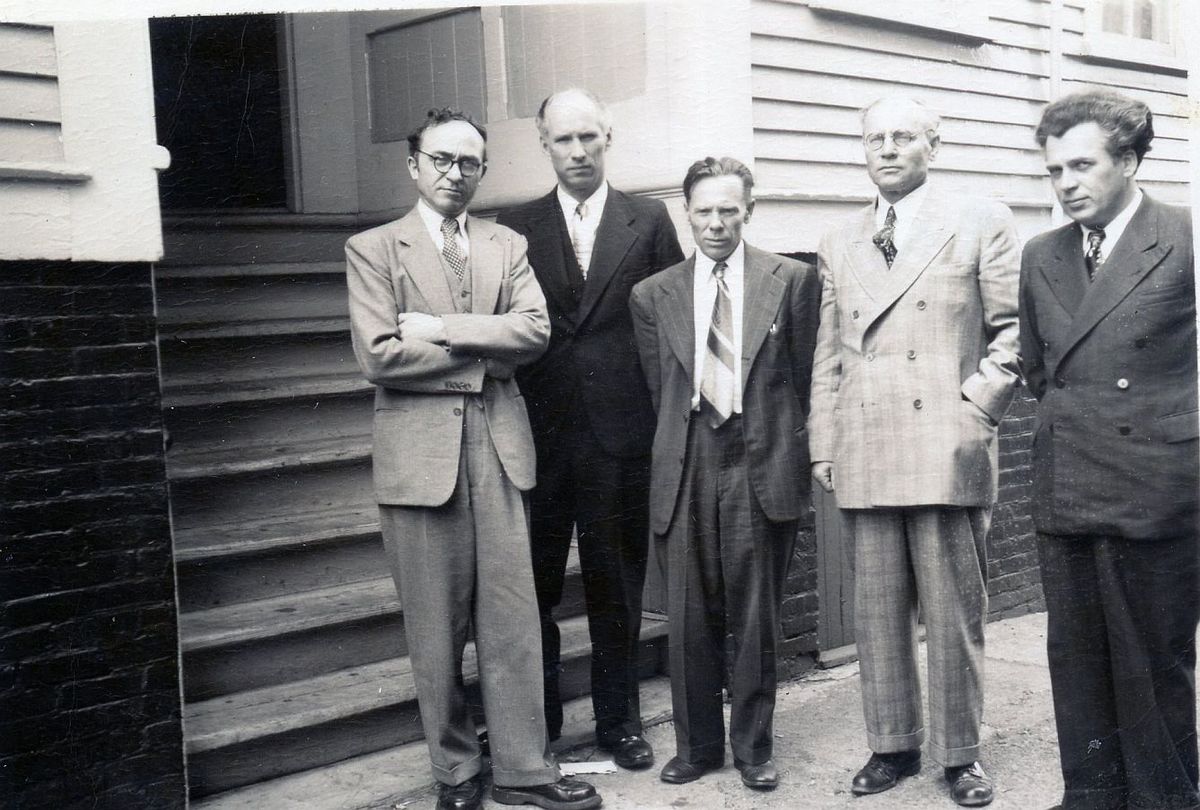
Participants of the second meeting, May 28, 1950. From left: B. Brazdžionis S. Santvaras, J. Aistis, F. Kirša, and A. Gustaitis.
We know little about the second meeting of the LWA, held in Boston on May 28, 1950, as no records have been located. However a few days before this meeting, on May 17, Aistis wrote to Faustas Kirša that “this meeting will be crucial, therefore it would be good for the entire board, including the candidates, to participate.”
-
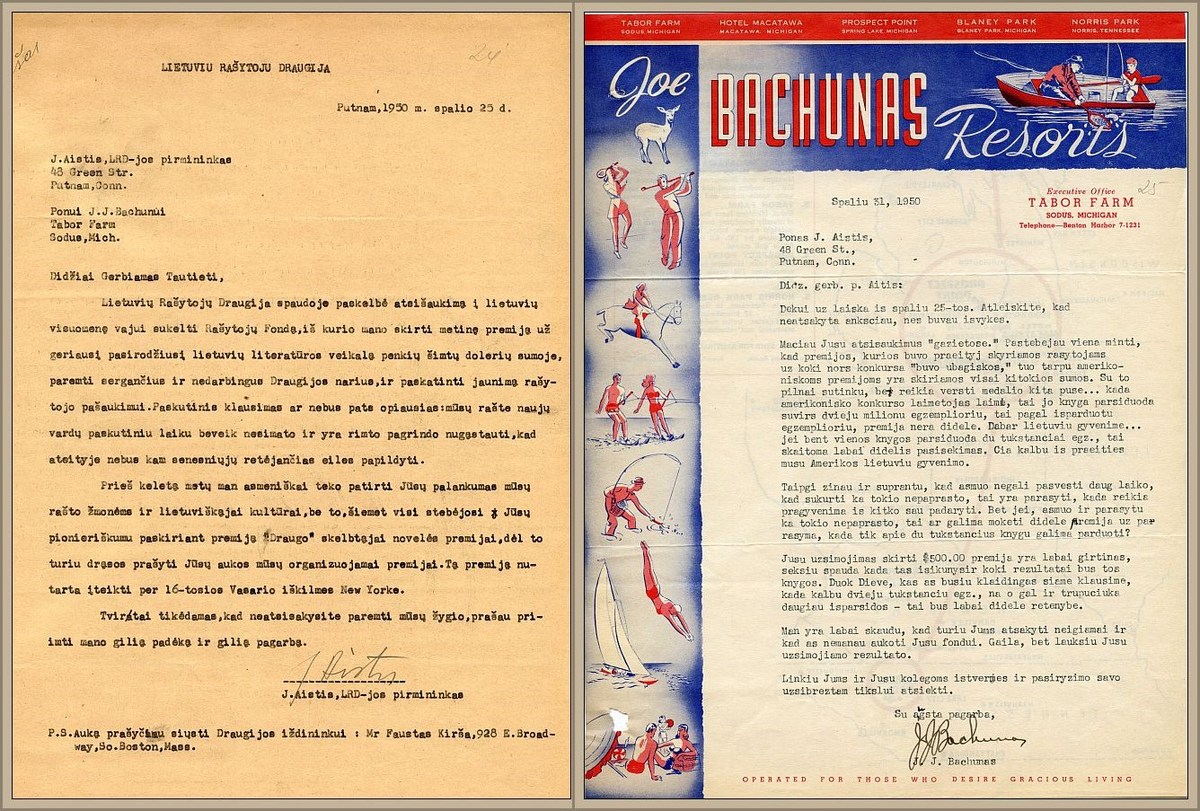
Aistis’ letter to Bachunas-Bačiūnas and negative reply.
The LWA continued with the activities commenced in Germany, such as presenting an annual award for the best Lithuanian literary work. As the LWA treasury was short of funds, the chairman tried to do some fund-raising. One approach was to appeal to well-to-do and successful Lithuanian-American businessmen. Pursuing this goal, Aistis wrote a letter to the well-known businessman Juozas Bachunas-Bačiūnas on October 25, 1950, asking for a donation. Mr. Bachunas-Bačiūnas refused the request. Nevertheless, the Board of Directors managed to raise $500, the amount of the annual literary award in 1950-1964. Starting in 1964, the Lithuanian Foundation provided the funding for the award.
-
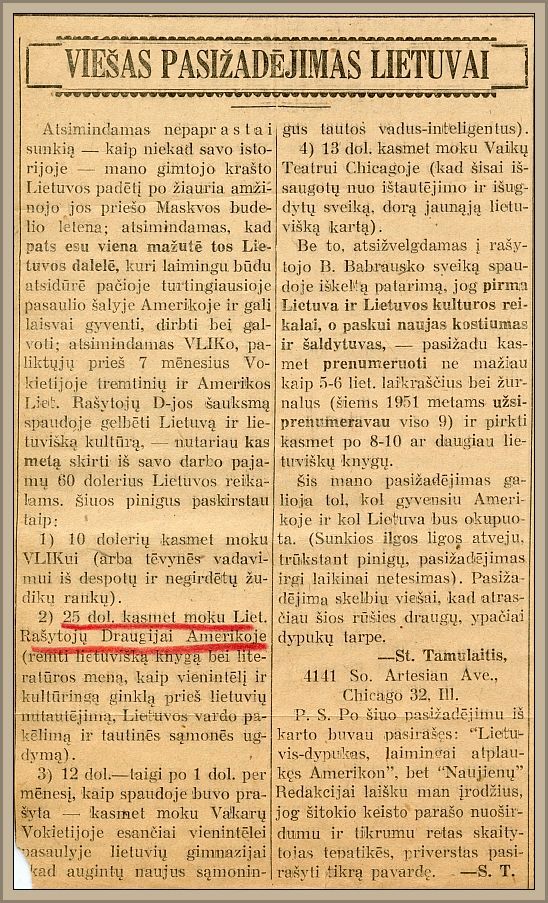
“A Public Commitment to Lithuania” by St. Tamulaitis, published in Naujienos on February 3, 1951.
The Association also asked ordinary Lithuanians for donations. Its appeal to support Lithuanian culture in the US was favorably received with public offers of monetary assistance. The Chicago newspaper Naujienos (Daily News) published a letter by St. Tamulaitis in its February 3, 1951 issue. He pledged to donate $60 annually for Lithuanian affairs as long as “he lives in America and while Lithuania is occupied.” Of this amount, $25 was intended for the Lithuanian Writers’ Assoc. to support Lithuanian books and literary art, the only weapon against losing our national identity.
-
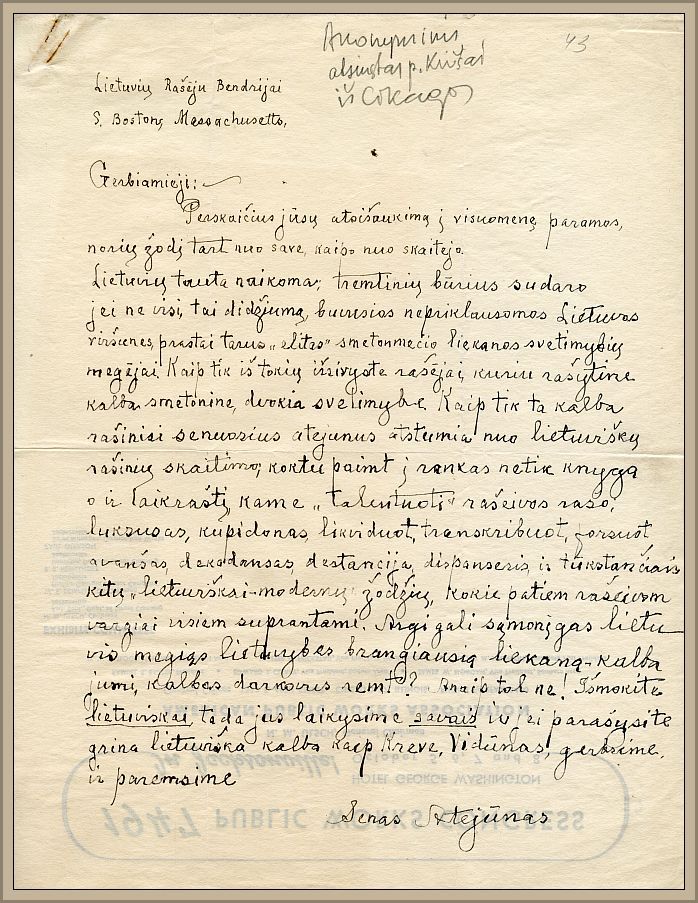
Letter sent to Kirša by Anonymous.
There were some Lithuanians who promised to support the LWA, but with a condition attached. In a letter sent to Faustas Kirša, “Old Arrival” criticizes the use of “bastardized” Lithuanian and the widespread use of such modern words as “decadence,” “Cupid,” “forced,” and etc. “Learn proper Lithuanian [hereinafter underlined by “Old Arrival”] first, only then we will accept you as one of us; if you write in pure Lithuanian, as Kreve and Vidunas did.” (Language of letter uncorrected)
-
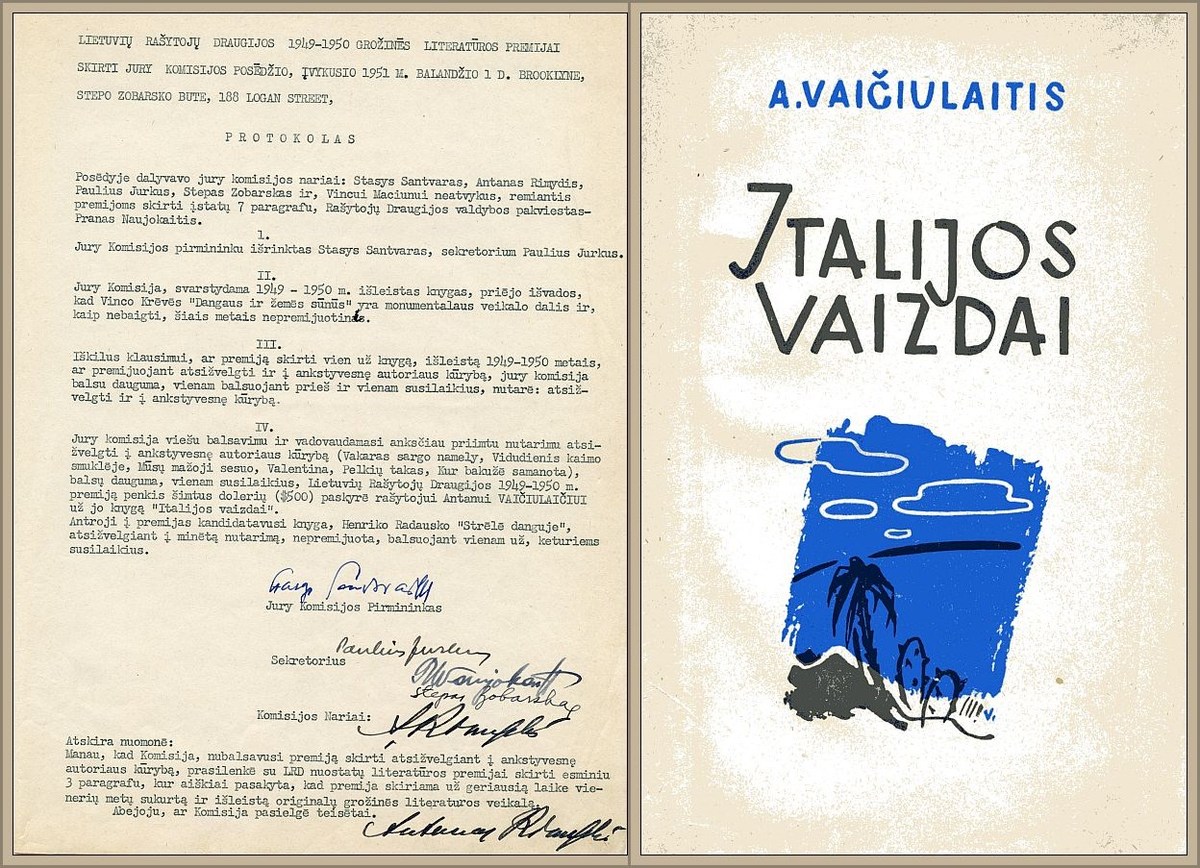
Minutes of the meeting of the literary awards jury, held April 1, 1951. The literary award of 1945-1950 was presented to Vaičiulaitis for his book Italijos vaizdai (Italian Pictures) (Stuttgart: Venta, 1949).
There were many disagreements, disputes, and even crossing of swords in the daily life of the Association. One example of controversy and discord among the writers was prompted by the decision of the Association’s award jury to present the $500 prize to Antanas Vaičiulaitis for his book Italijos vaizdai (Italian Pictures) as the best literary work of 1945-1950. The decision was not unanimous. One member of the jury, Antanas Rimydis, expressed an opinion, which was documented in the minutes of the jury’s meeting. According to him, “by deciding to award the author’s [Vaičiulaitis] earlier work, the jury overstepped the Association’s regulations. Section 3 on the literary award clearly states that it must be presented for the best original work of fiction published in the current year.”
-
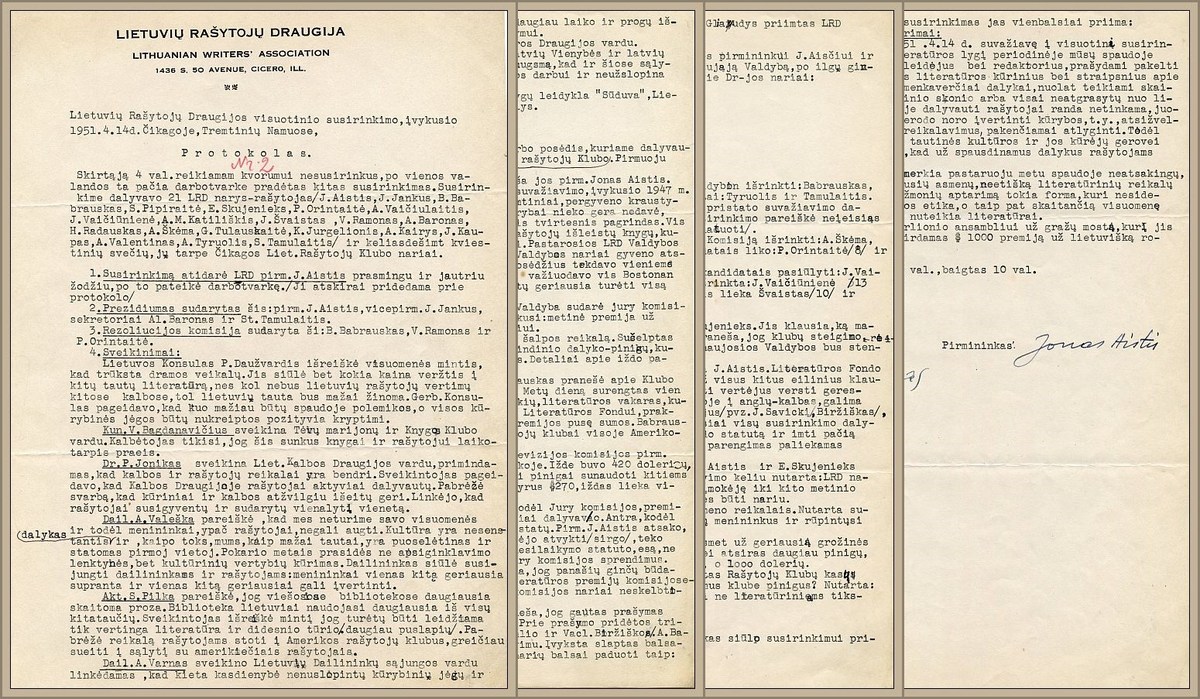
Minutes of the Writers’ congress, held in Chicago in 1951.
Aistis’ term of office as chairman ended on April 14, 1951. He declined to be nominated as chairman of the Board of Directors at the general meeting held the same day in Chicago and Benediktas (Benys) Babrauskas, chairman of the Chicago Lithuanian Writers’ Club, was elected the new chairman of the LWA. During the meeting, the participants expressed concerns regarding the level of contemporary Lithuanian émigré literature and found its quality lacking and unsatisfactory, especially that of the periodic press. They appealed to newspaper publishers and editors, “requesting that they improve it … so that poor quality literature, steadily provided to readers, would not dull their artistic taste and discourage them from reading.” The Writers’ congress also requested that newspaper publishers start paying royalties to writers. At the same meeting, it was decided to increase the amount of the annual literary award from $500 to $1,000.
